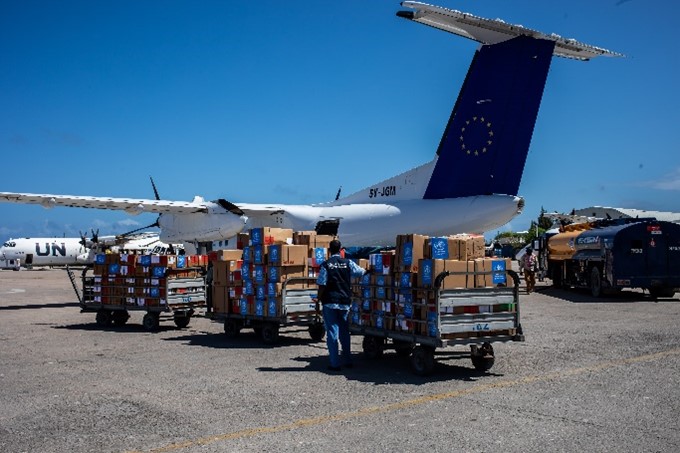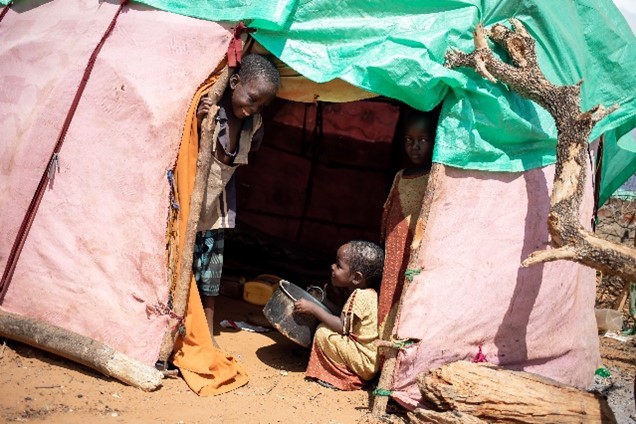 Since 2020, the EU and ECHO have provided continuous support to WHO emergency response activities, including by airlifting vital medical equipment and supplies across Somalia, including during the COVID-19 lockdown Mogadishu, 24 September 2022 – The World Health Organization (WHO) country office for Somalia has launched a €1 000 000 project, which aims to deliver crucial emergency health supplies and essential medicines to drought-affected populations across Somalia in support of the organization’s ongoing life-saving essential health interventions. This project is funded by the European Union’s Humanitarian Aid and Civil Protection Operation.
Since 2020, the EU and ECHO have provided continuous support to WHO emergency response activities, including by airlifting vital medical equipment and supplies across Somalia, including during the COVID-19 lockdown Mogadishu, 24 September 2022 – The World Health Organization (WHO) country office for Somalia has launched a €1 000 000 project, which aims to deliver crucial emergency health supplies and essential medicines to drought-affected populations across Somalia in support of the organization’s ongoing life-saving essential health interventions. This project is funded by the European Union’s Humanitarian Aid and Civil Protection Operation.
Through this support, the federal and state ministries of health and WHO will provide integrated life-saving health services to drought-affected people at the community level through the outreach services, as well as through primary health centres. Part of these supplies will also be used to support critical care for severe pneumonia, diarrhoeal diseases, as well as for other medical conditions that might be needed to be treated at the secondary health facility level. These supplies will also help Somalia mount an appropriate response to disease outbreaks caused by the drought, including cholera and measles. Provisions being delivered will include medical kits to address cholera and severe acute malnutrition with medical complications, as well as other emergency medical equipment and items from WHO’s catalogue of prequalified supplies. The consignments will also comprise laboratory testing kits and reagents, in addition to 59 different kinds of basic and supplementary medicines, among other items.
Supplies procured by WHO through this EU contribution will be delivered to WHO warehouses located in Mogadishu, Garowe, and Hargeisa, after which they will be handed over to the Government or partners at health facility level to provide life-saving services to vulnerable populations. The district health information system (DHIS2), alongside the early warning alert and response network (EWARN) surveillance system, will store information on supplies that are received and used at state level
 The interventions will deliver life-saving resources to the most vulnerable populations living in different states of the country, including communities that have had their immunity lowered due to the ongoing drought, which makes it easier for them to get infected with diseases. Credit: Somalia/Arete The project will directly benefit over 740 000 drought-affected people, around half of whom are women. Direct beneficiaries also include people displaced by drought living in camps for internally displaced persons, as well as host communities in drought-affected districts. The project will also target people living with disabilities, people with little or no access to health services, and people living in areas where epidemic-prone diseases are highly prevalent. The interventions will address the needs of drought-affected communities living in the Banadir region and districts in Galmudug state, Hirshabelle state, Jubaland state, Puntland, Somaliland, and Southwest state.
The interventions will deliver life-saving resources to the most vulnerable populations living in different states of the country, including communities that have had their immunity lowered due to the ongoing drought, which makes it easier for them to get infected with diseases. Credit: Somalia/Arete The project will directly benefit over 740 000 drought-affected people, around half of whom are women. Direct beneficiaries also include people displaced by drought living in camps for internally displaced persons, as well as host communities in drought-affected districts. The project will also target people living with disabilities, people with little or no access to health services, and people living in areas where epidemic-prone diseases are highly prevalent. The interventions will address the needs of drought-affected communities living in the Banadir region and districts in Galmudug state, Hirshabelle state, Jubaland state, Puntland, Somaliland, and Southwest state.
“Somalis are no strangers to droughts, but what the country confronts now is unprecedented and demands our best collective effort. The reported number of acute watery diarrhoea/suspected cholera cases is way over doubling that of last year; for measles, the reported cases this year are more than four times that of 2021. Children under the age of 5 are those most likely to die in the absence of medical and nutritional support,” said Javier Rio Navarro, Head of the EU Humanitarian Office for Somalia. “Through this support, part of the EU humanitarian contribution of over € 61 million in 2022, health facilities and humanitarian staff in hardest hit locations will be better equipped to continue their lifesaving efforts.”
“We have said it before, and we are saying in again – the current food security crisis is also a health crisis. When people are starving, and in hunger, their basic immunity goes down. As a result, they become more vulnerable to diseases. These people affected by the drought are from marginalized communities, they were living in very tough conditions and had limited access to health, immunization, and other basic services even before this drought. By partnering with ECHO, we will provide essential medical supplies to meet critical healthcare needs of these and more vulnerable groups and protect their health. Through improving access to health care for these marginalized group, we are certain that many deaths will be averted, many diseases will be prevented,” said Dr Mamunur Rahman Malik, WHO Representative to Somalia and Head of Mission.
These life-saving resources complement Somalia's Essential Package of Health Service (EPHS), 2020, which aims to offer the most basic essential services, and supplementary services where possible, to every person no matter where they live.
In November 2021, the Federal Government of Somalia declared a state of emergency over the ongoing drought. As a result of the drought, around 7.7 million people are currently in need of humanitarian assistance and protection, and one million people have been displaced. Between January and September 2022, Somalia’s EWARN system reported spikes in epidemic-prone diseases, such as acute diarrhoea, cholera and other waterborne diseases. Additionally, cases of vaccine-preventable diseases such as measles, increased by 20% during this period.
The current support of ECHO for WHO’s ongoing life-saving interventions is expected to help avert an additional 8106 new cases of cholera; 64 393 cases of acute diarrhoea; 30 000 cases of measles; 8464 cases of severe acute malnutrition with medical complications; and 10 000 cases of severe acute respiratory infections in the drought-affected communities by way of scaling up and delivering the life-saving health interventions to these communities at places where they are . Using lessons learnt from the 2016–2017 drought in Somalia, these intensive and urgent life-saving interventions rolled out by WHO, in close collaboration with federal and state health ministries, ECHO, other partners as well as the clusters for health, water, sanitation and hygiene (WASH) and nutrition, will cushion communities from the effects of drought.
For additional information, please contact:
EU Humanitarian Aid: Mathias Eick, This e-mail address is being protected from spambots. You need JavaScript enabled to view it
Kyle DeFreitas, WHO Somalia External Relations Lead, This e-mail address is being protected from spambots. You need JavaScript enabled to view it
Fouzia Bano, WHO Chief of Staff ai, Communications Officer, This e-mail address is being protected from spambots. You need JavaScript enabled to view it
-----------------
Note to editors
Please see the links below for additional information on recent support received from the European Union Delegation to Somalia:
EU-WHO Newsletter 2021: *|MC:MC_MC_SUBJECT|* (campaign-archive.com)




